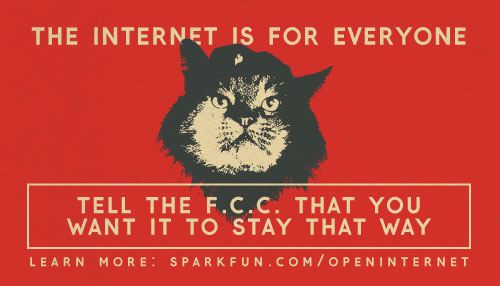Now more than ever, online privacy has been called into question with mega-corporations, local ISPs, and social media outlets all weighing in on the debate over whether we should be profiting from or looking after and protecting users' private information. But what can you as a user do to help protect your information? What information are they even tracking or sharing? These are questions I keep hearing, and the answer all starts with that boring pop-up on every new user agreement you've ever not read, The Terms of Service and Privacy Policy.
Ugh. I know; I know. "But I never read those! I just accept them and get on with my day." Well, friend, you are not alone! This is the common response among online users. All too often if we "trust" the organization enough to be signing up with them, we likely also trust them to write policy that is responsible and protects the end user.
Here at SparkFun, we have a long history of discussion about internet privacy, we've defended the privacy of our user data, and we've even shown support for the protection of internet rights through charitable donation. Security, privacy and the future of the internet are not new topics of conversation around the company kegerator.
With everything going on in the world right now, I thought it might be a great time to quickly remind you of our privacy policy and speak briefly to it.
Since I started here at SparkFun in 2008, one value has always been held on high: transparency. We apply this to many aspects of our daily business. In this case, for you as a customer, we work hard to provide transparency to what data we collect, and what we do with it. Additionally, we will inform users if we find that their data has been compromised.
You'll notice that there are a few comments in the policy pointing out that we will not release data for financial gain or competitive advantage. This one is important: SparkFun has in the past, and will in the future, stand by our data policy and not disclose user information to our partners, suppliers or distributors in a way that violates our terms in the privacy policy. If a partner requires we share information that we have promised our customers is private, we will no longer do business with that entity. Sometimes this may mean we can't carry a product line that we really love, or that we discontinue an item that is a strong seller. The fact is, we take your privacy seriously and we respect your data.
If you are interested in learning more about digital privacy, freedom of speech, and other internet freedom topics, check out our friends over at the Electronics Frontier Foundation.








Want to read something scary? Check out Verizon's "Privacy Policies". http://www.verizon.com/about/privacy/full-privacy-policy
"We collect information when you communicate with us and when you use our products, services and sites. This includes information you provide such as name and contact information, images, voice recordings or voiceprints, other biometric identifiers, the reason for contacting us, driver’s license number, Social Security Number and payment information. Service and device usage information we collect includes call records, websites visited, wireless location, application and feature usage, network and device data including battery life and apps on your device, product and device-specific information and identifiers, router connections, service options you choose, mobile and device numbers, video streaming and video packages and usage, movie rental and purchase data, TV and other video viewership, and other similar information." Seriously? You really "need" all that to provide phone, cable and ISP services?
I was a subscriber to Yahoo Groups, until their service went down the toilet. After reading the policy information, I have closed my yahoo accounts permanently.
I wish closing my accounts deleted my data from a company's servers. Somehow I doubt that's the case.
I'm curious what kind of data a supplier would want that they'd lose a paying customer over it.
Just wanted to say thanks! Keep fighting the good fight.